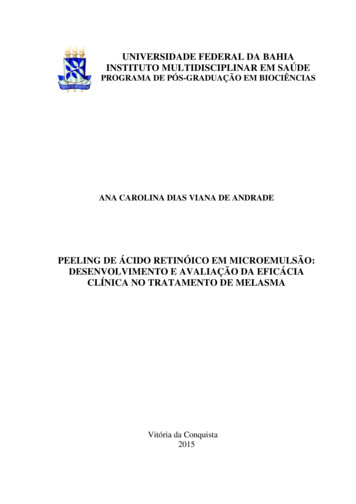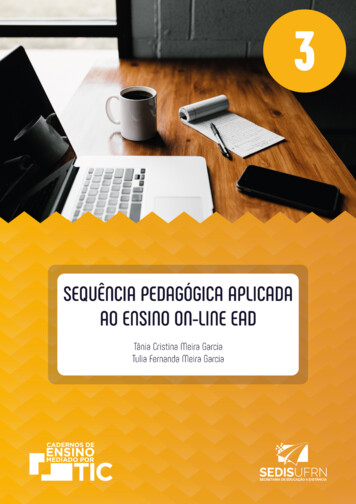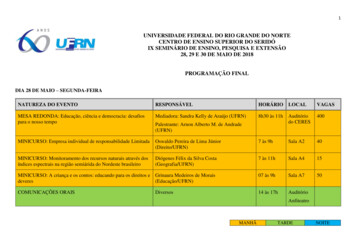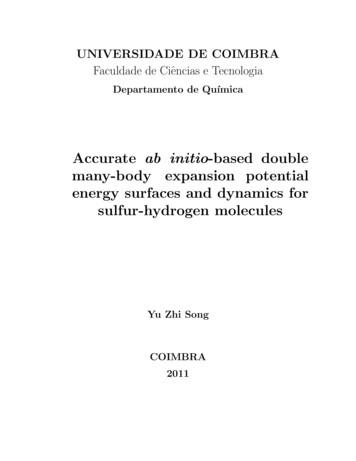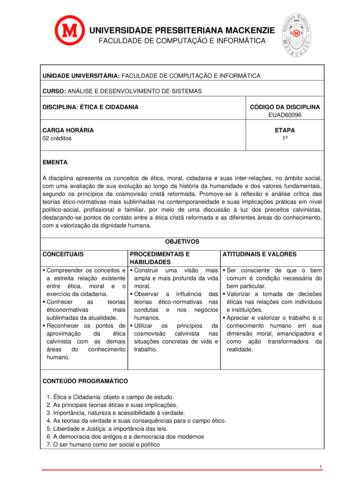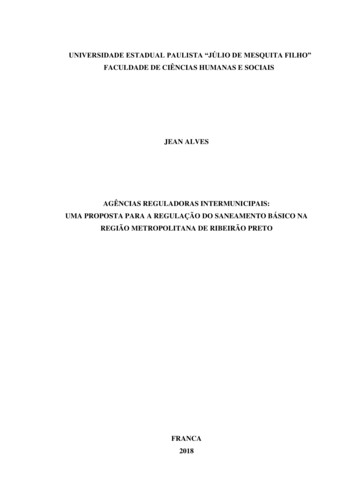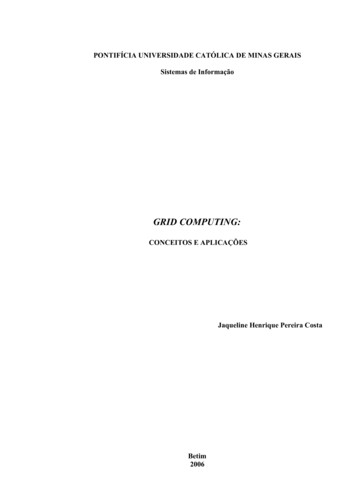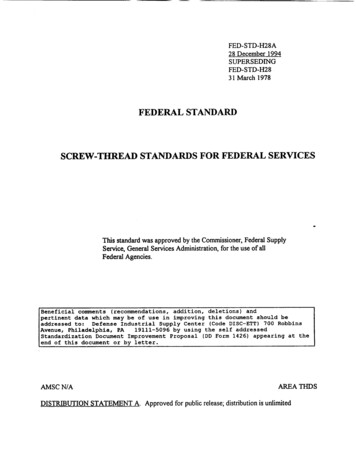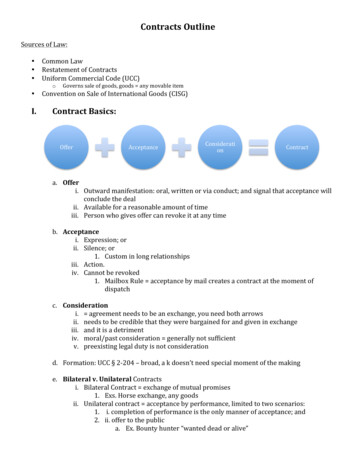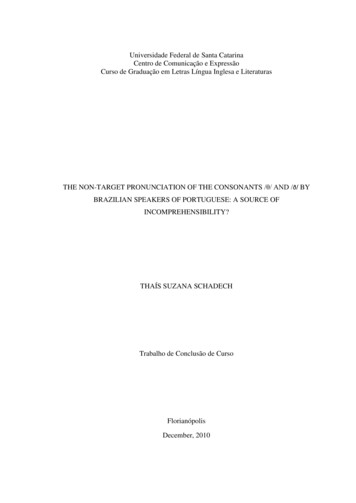
Transcription
Universidade Federal de Santa CatarinaCentro de Comunicação e ExpressãoCurso de Graduação em Letras Língua Inglesa e LiteraturasTHE NON-TARGET PRONUNCIATION OF THE CONSONANTS /θ/ AND /ð/ BYBRAZILIAN SPEAKERS OF PORTUGUESE: A SOURCE OFINCOMPREHENSIBILITY?THAÍS SUZANA SCHADECHTrabalho de Conclusão de CursoFlorianópolisDecember, 2010
iiThe non-target pronunciation of the consonants /θ/ and /ð/ by Brazilian speakers ofPortuguese: a source of incomprehensibility?Trabalho de Conclusão de Curso (TCC) para adisciplina LLE7462 do Departamento de Língua eLiteratura Estrangeira do Centro de Comunicação eExpressão da Universidade Federal de SantaCatarina – Curso de Letras – Língua Inglesa eLiteraturas, como requisito parcial para obtenção dotítulo de Bacharel em Letras – Língua Inglesa eLiteraturas.Orientadora: Dra. Rosane SilveiraBANCA EXAMINADORAProfª. Dra. Rosane SilveiraProfª. Dra. Denize Nobre-OliveiraFlorianópolisDecember, 2010
iiiACKNOWLEDGEMENTSMany people have helped me during this course and during the TCC development, andhere I would like to express my sincere gratitude and appreciation for them. It is hard to decide onwhom to start though, for different people have supported me in different situations. I wouldrather start by thanking my parents then, not only for making my staying in Florianópolis possibleduring all this time, but also for encouraging me to face the difficulties that arose during thecourse and in my personal life. I would also like to thank the rest of my family for their warmwelcome every time I went back to my hometown. Then, my special thanks go to my husband forthe emotional support and also for encouraging me when I was tired and insecure. For this and formuch more I‟m the most grateful.This work wouldn‟t be possible without the assistance of my advisor Professor RosaneSilveira. I consider myself very lucky for having a talented and caring professor as advisor, whoso promptly accepted to help me. I also must thank Professor Rosane for being so patient and forteaching me so much, since the project development till the end of this paper. I express mygratitude for Professor Denize Nobre-Oliveira too, for she accepted to read this paper and be partof the examination board. In addition, this research would not exist without the participants‟ help.Actually, they were the fundamental part of it. Here I express my gratitude for their promptness inparticipate in this research. I also thank Rafael Matielo, who has always encouraged and helpedme when I needed, and Regina Claúdia too, for giving suggestions that improved my work.Finally, I‟m very grateful to Sônia Regina and Rita Malheiros, my special co-workers. Ithank them for allowing me to study when I was overloaded, for the shifts exchange, and for themany motivational talks. I‟m glad I‟m surrounded by so many special people and I hope somedayI‟ll be able to return the affection and support I received during the course and especially duringthe TCC development.
ivABSTRACTThe non-target pronunciation of the consonants /θ/ and /ð/ by Brazilian speakers ofPortuguese: a source of incomprehensibility?Thaís Suzana SchadechUniversidade Federal de Santa Catarina2010Prof. Dr. Rosane SilveiraSupervisorWhen learning English, Brazilian learners tend to replace the consonant sound /θ/ with /s/, /t/,or /f/, and replace /ð/ with /z/, /d/, or /v/ (Reis, 2006). Taking this into consideration, theobjective of this study is to analyze if the non-target pronunciations of these consonant soundsby Brazilians hinder English native speakers‟ comprehension, which can be defined as “theease or difficulty with which a listener understands L2 accented speech”, according toDerwing, Munro and Thomson (2007, p. 360). Therefore, in this study, ten samples of speechcontaining the pronunciation of the sounds /θ/ and /ð/ by Brazilians were collected from TheSpeech Accent Archive site and presented to a group of eleven native English speakers whowere familiar with the way Brazilians pronounce English words. Then, after answering aquestionnaire eliciting personal information, these listeners were asked to tell how difficult itwas for them to understand the words that contained those consonant sounds. Being the mainresearch question: Does the non-target pronunciation of /θ/ and /ð/ by Brazilian speakers ofPortuguese hinder English native speakers’ comprehension?, it was possible to conclude thatthe non-standard pronunciation of the interdental fricative sounds by Brazilians does hinderEnglish native speakers‟ comprehensibility, even when they are already familiar with theaccent. Therefore, teaching and practicing these sounds are important in order for ESLspeakers not to have communication problems.Key-words: comprehensibility, interdental fricative sounds, pronunciationNumber of pages: 88Number of words: 14410
vRESUMOThe non-target pronunciation of the consonants /θ/ and /ð/ by Brazilian speakers ofPortuguese: a source of incomprehensibility?Thaís Suzana SchadechUniversidade Federal de Santa Catarina2010Prof. Dr. Rosane SilveiraSupervisorUma das principais dificuldades enfrentadas pelos brasileiros ao aprender inglês é a pronúnciadas fricativas interdentais /θ/ e /ð/. Devido a essa dificuldade, é comum ocorrer a substituiçãodo fonema /θ/ por /s/, /t/ ou /f/, bem como a substituição do fonema vozeado /ð/ por /z/, /d/ ou/v/. Portanto, baseado neste problema de pronúncia, o principal objetivo deste estudo éverificar se as pronúncias não padrão destes fonemas dificultam a compreensão dos falantesnativos de inglês. Compreensão pode ser aqui definida como a facilidade ou dificuldade comque os falantes nativos conseguem compreender a fala de um falante de segunda língua comsotaque (Derwing, Munro & Thomson, 2007, p. 360). Assim sendo, a principal pergunta queguiou o estudo foi: As pronúncias não padrão dos fonemas /θ/ e /ð/ dificultam a compreensãodos falantes nativos de inglês? De forma a responder esta pergunta, dez gravações (feitas porbrasileiros) em inglês contendo pronúncias das fricativas interdentais foram coletadas do sítioThe Speech Accent Archive. Em seguida, elas foram apresentadas a onze falantes nativos doinglês já familiarizados com o sotaque brasileiro para que avaliassem o grau de dificuldadepara entender as palavras que continham tais pronúncias. Ao final da pesquisa foi possívelconcluir que as pronúncias não padrão das consoantes /θ/ e /ð/ por brasileiros realmentedificultam a compreensão dos falantes nativos do inglês, mesmo que estes já sejamfamiliarizados com o sotaque brasileiro. Portanto, é necessário que tais fonemas sejamensinados e praticados pelos brasileiros ao aprender inglês de forma que eles não tenhamproblemas ao se comunicar com os falantes nativos desta língua.Palavras-chave: compreensão, fricativas interdentais, pronúnciaNúmero de páginas: 88Número de palavras: 14410
viTABLE OF CONTENTSCHAPTER 1. 1INTRODUCTION . 11.1. Contextualization . 11.2. Objective and Research Questions . 21.3. Justification and Significance of the Study. 41.4. Organization of the Study . 5CHAPTER 2. 6REVIEW OF THE LITERATURE . 62.1. Defining terms: comprehensibility, intelligibility, and accentedness . 62.2. The Brazilian non-target pronunciation of the interdental fricative sounds in English . 82.3. The issue of the foreign-accent . 102.4. Variables involved in comprehensibility rating . 11CHAPTER 3. 13METHOD . 133.1. Participants. 133.1.1. The speakers . 133.1.2 The listeners . 153.2. Instruments. 163.2.1. Questionnaire I . 163.2.2. Questionnaire II . 193.3. Procedures . 203.4. Data Analysis . 21CHAPTER 4. 23RESULTS AND DISCUSSION . 23
vii4.1. Speakers‟ amount of non-target pronunciations and proficiency levels . 234.2. Information on listeners‟ profiles. 254.2.1. Information on listeners‟ personal data and education. 254.2.2. Listeners‟ familiarity with Brazilians and the Brazilian accent . 264.2.3. Main Brazilians‟ pronunciation problems in English noticed by the listeners . 274.3. The non-target pronunciation of /θ/ and /ð/ by Brazilians and English native speakers‟comprehension . 294.4. Familiarity with Brazilian accent and native speakers‟ comprehensibility . 364.5. Listeners‟ comprehension and speakers from different levels of proficiency . 40CHAPTER 5. 42CONCLUSION . 425.1. Summary of the results . 425.2. Pedagogical Implications . 445.3. Limitations of the Study and suggestion for further research . 44References. 45Appendices . 45
viiiTABLESTable 1: Speakers‟ profiles . 15Table 2: Speakers‟ profile versus proficiency level assigned by the listeners . 24Table 3: Listeners‟ personal data and education . 26Table 4: Listeners‟ familiarity with Brazilians and Brazilian accent . 27Table 5: Main pronunciation problems faced by Brazilians in English . 28Table 6: Speakers‟ scores and proficiency levels assigned by each listener . 31Table 7: Speakers‟ final comprehensibility rate average. 34Table 8: Speakers‟ non target pronunciation of the words and listeners‟ comprehensibilityrates. 35Table 9: Comprehensibility rate for /θ/ and /ð/ and the different levels of proficiency . 41
ixGRAPHSGraph 1: Listeners‟ amount of time in Brazil and Comprehensibility rate for /θ/ . 37Graph 2: Listeners‟ amount of time in Brazil and Comprehensibility rate for /ð/ . 37Graph 3: Listeners‟ amount of speaking BP and Comprehensibility rate for /θ/ . 38Graph 4: Listeners‟ amount of speaking BP and Comprehensibility rate for /ð/ . 39Graph 5: Listeners‟ amount of time talking to Brazilians in English and comprehensibility ratefor /θ/ . 39Graph 6: Listeners‟ amount of time talking to Brazilians in English and comprehensibility ratefor /ð/ . 40Graph 7: Speakers‟ proficiency level and the respective comprehensibility rates . 4
welcome every time I went back to my hometown. Then, my special thanks go to my husband for the emotional support and also for encouraging me when I was tired and insecure. For this and for much more I‟m the most grateful. This work wouldn‟t be possible without the assistance of my advisor Professor Rosane Silveira. I consider myself very lucky for having a talented and caring professor as

